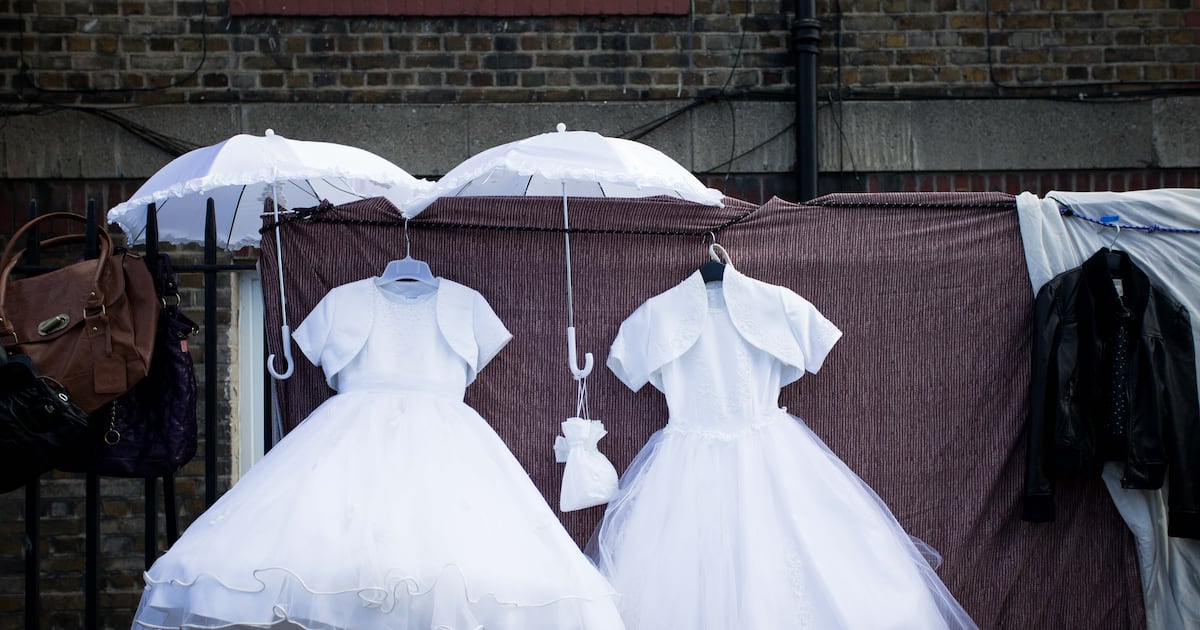Top Stories
Parents Debate Secular Celebrations in Place of First Communions

A recent WhatsApp exchange among parents at an Educate Together school has sparked discussions about the significance of secular celebrations in lieu of traditional First Holy Communions. One parent, Rachel O’Dwyer, expressed concern over a proposed event called an “Eachtra,” intended for children not participating in the Communion ceremony. This event, described as a party with “mystical overtones,” has prompted mixed reactions among parents, highlighting an ongoing debate about the role of ceremony in childhood.
The initial WhatsApp messages were about preparations for children in O’Dwyer‘s son’s class making their First Holy Communion, a significant milestone in the Catholic faith. Following that, a poll was conducted for the Eachtra, which has garnered interest but also some apprehension. O’Dwyer noted that the school itself is not responsible for this initiative, emphasizing that it stems from parental desires for a celebratory event rather than any institutional directive.
The term “Eachtra,” which translates to “adventure” in Irish, carries a connotation rooted in folklore, where heroes embark on journeys of self-discovery. O’Dwyer humorously imagines a scenario in which children are thrust into an extreme adventure, reflecting her ambivalence towards the secular festivities. The First Holy Communion is traditionally a child’s first formal participation in the Eucharist, typically occurring around ages seven or eight when children are considered capable of moral reasoning.
With approximately 88% of primary schools in Ireland adhering to a Catholic ethos, there exists a notable discrepancy between the number of Communions being celebrated and the actual percentage of the population identifying as Catholic—less than 70% across all age groups. This has led to questions about the relevance of such ceremonies in a more diverse educational landscape.
The Eachtra aims to provide an alternative that resonates with the values of the middle-class families within the Educate Together framework. Critics of the initiative have expressed concern that such secular milestones may inadvertently mimic the very exclusivity they seek to avoid. One parent referred to Educate Together as “Segregate Together,” highlighting the irony of creating divisions even within non-religious contexts.
These secular events often seek to foster a sense of community and belonging among children, albeit through different rituals. For instance, previous celebrations have included activities like pouring coloured sand into vases, symbolizing unity and diversity. Some parents have taken to social media platforms, such as Reddit, to share their thoughts, with many citing fears that their children may feel excluded from the communal excitement surrounding traditional Communions.
O’Dwyer points to a recurring theme among parents: the desire for their children to participate in celebratory events, even if they do not engage with the religious underpinnings. The feedback indicates that some children yearn for the associated festivities—such as elaborate dresses and gatherings—rather than the religious practices themselves. One mother noted her daughter’s wish for both the celebration and the party aspect without the actual religious teachings, leading to comments about a potential “a la carte Catholic” approach.
Despite these sentiments, many children in Educate Together schools do not receive any religious instruction, suggesting that feelings of exclusion may stem more from parental perspectives than from the children themselves. O’Dwyer reflects on her own child’s indifference towards a coming-of-age ceremony, underscoring that the push for the Eachtra may be more about parental expectations than genuine desire from the children.
As the date for the Eachtra approaches, parents continue to grapple with the implications of such secular celebrations. The divide between traditional and modern interpretations of childhood milestones raises important questions about community, belonging, and the evolving nature of childhood rituals in contemporary society.
-

 Top Stories2 months ago
Top Stories2 months agoTributes Surge for 9-Year-Old Leon Briody After Cancer Battle
-

 Entertainment3 months ago
Entertainment3 months agoAimee Osbourne Joins Family for Emotional Tribute to Ozzy
-

 Politics3 months ago
Politics3 months agoDanny Healy-Rae Considers Complaint After Altercation with Garda
-

 Top Stories3 months ago
Top Stories3 months agoIreland Enjoys Summer Heat as Hurricane Erin Approaches Atlantic
-

 World4 months ago
World4 months agoHawaii Commemorates 80 Years Since Hiroshima Bombing with Ceremony
-

 Top Stories2 months ago
Top Stories2 months agoNewcastle West Woman Patricia Foley Found Safe After Urgent Search
-

 Top Stories4 months ago
Top Stories4 months agoFianna Fáil TDs Urgently Consider Maire Geoghegan-Quinn for Presidency
-

 World4 months ago
World4 months agoGaza Aid Distribution Tragedy: 20 Killed Amid Ongoing Violence
-

 World4 months ago
World4 months agoCouple Convicted of Murdering Two-Year-Old Grandson in Wales
-

 Top Stories3 months ago
Top Stories3 months agoClimbing Errigal: A Must-Do Summer Adventure in Donegal
-

 Top Stories3 months ago
Top Stories3 months agoHike Donegal’s Errigal Mountain NOW for Unforgettable Summer Views
-

 World4 months ago
World4 months agoAristocrat Constance Marten and Partner Convicted of Infant Murder









